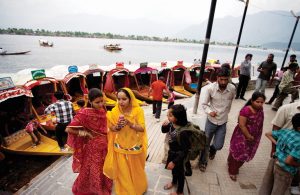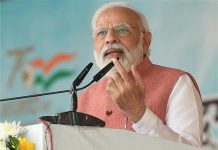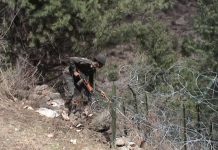 Talk of delimitation in Jammu and Kashmir has become a fresh source of unease in the troubled state. The majority of people in the state suspect in this a design to manipulate the number of seats in a way that reduces the dominant role of Kashmir Valley in formation of the state government. And the BJP itself has made no secret of its intention to do so. The move, the party’s leaders have argued, will correct the “imbalance” between Kashmir and Jammu. Some government officials in their statements to media have argued that the move would facilitate the installation of a Hindu Chief Minister in the state.
Talk of delimitation in Jammu and Kashmir has become a fresh source of unease in the troubled state. The majority of people in the state suspect in this a design to manipulate the number of seats in a way that reduces the dominant role of Kashmir Valley in formation of the state government. And the BJP itself has made no secret of its intention to do so. The move, the party’s leaders have argued, will correct the “imbalance” between Kashmir and Jammu. Some government officials in their statements to media have argued that the move would facilitate the installation of a Hindu Chief Minister in the state.
“The plan is to appoint a delimitation commission and redraw the scope and size of Assembly constituencies and determine the number of seats to be reserved for Scheduled Castes,” an unnamed government official was quoted to have said this in the media.
The proposal has been met with opposition from the major regional parties in the state. “When delimitation takes place in the rest of the country, the BJP is welcome to apply it to Jammu and Kashmir. Until then we in the National Conference will oppose, tooth and nail, any attempt to make changes without a mandate from the people of the state,” said NC vice-president and former Chief Minister Omar Abdullah.
“The freeze on delimitation was applied to J&K and was done to bring the state in line with the rest of the country. The same was challenged & upheld in both the High Court of J&K & the Supreme Court,” Omar tweeted.
“A freeze on delimitation has been applied to the entire country until 2026 and contrary to the way some ill informed TV channels are trying to sell it, it isn’t just a J&K specific freeze. It’s rather surprising that the BJP, which talks about bringing J&K at par with other states by removing (Articles) 370 & 35A, now wants to treat J&K differently from other states in this one respect.”
Similarly, former chief minister Mehbooba Mufti tweeted: “Distressed to hear about GoIs plan to redraw assembly constituencies in J&K. Forced delimitation is an obvious attempt to inflict another emotional partition of the state on communal lines. Instead of allowing old wounds to heal, GoI is inflicting pain on Kashmiris.”
The People’s Conference leader Sajad Gani Lone, otherwise seen close to the BJP has also slammed the move. “Hope and pray that media reports about Kashmir aren’t true. Don’t understand the earth shattering hurry. And this perception of being wronged at a provincial level. If thousands of graves in Kashmir don’t add up to people being wronged, I wonder what wronged means,” tweeted Lone.
However, for now, the BJP seems intent on moving ahead with the fraught proposal. On his first day in office, Home Minister Amit Shah had closed door meetings with Governor Satyapal Malik, Intelligence Bureau Director Rajiv Jain and Home Secretary Rajiv Gauba.
This has deepened apprehensions in the Valley. People see the move as part of a larger plan to alter the demography of the state. Adding to the complications is that J&K is under Governor’s rule, so carrying out delimitation exercise is deemed to be devoid of legitimacy. However, the last delimitation on provisional basis was done in 1993 by Governor Jagmohan when Jammu and Kashmir was divided into 87 assembly constituencies.
Though next exercise was due in 2005, but in 2002, the Farooq Abdullah government chose to freeze delimitation until 2026 by amending the Jammu & Kashmir Representation of the People Act, 1957, and Section 47(3) of the Constitution of Jammu & Kashmir.
The Governor, however, is deemed competent to amend Section 47 of the Constitution to delete the objectionable proviso which barred the setting up of a delimitation commission. Also, Section 3 of the Representation of People Act gives the Governor the mandate to form a delimitation commission.
Member Parliament and the former High Court judge Justice Hasnain Masoodi differs. According to him, the elected government is important for delimitation exercise. “Such an exercise can be undertaken only after the elections are held, state assembly and a duly elected government are in place and necessary amendment is made in Section 47 of the Constitution of Jammu and Kashmir and Section 3 Jammu and Kashmir Representation of Peoples Act 1957, pre-poning the delimitation. Any effort of delimitation would be a misadventure and offend the Constitution and the Representation of Peoples Act,” Justice Masoodi said in a statement.
Also, Justice Masoodi says that there is no reason to single out Jammu and Kashmir for such an exercise once the delimitation was frozen in all the states. “Delimitation cannot be done when the Constitution of Jammu and Kashmir does not permit it as the Constitutional mechanism to pave way for it is not in place.”
Demographic reality
J&K is India’s only Muslim majority state with a 68.3 per cent Muslim population. Hindus are the second largest community with 30 per cent population followed by Sikhs who are just 2 per cent, and Buddhists who are a little more than 1 per cent.
So, demographically speaking there is no scope for a Hindu Chief Minister based on communal considerations. That is, unless Hindus and Muslims in a true secular spirit don’t set much store by the religion of the politicians.
But this doesn’t seem to be the case now. More so, with the BJP trying to accomplish this seemingly impossible task through political engineering, with delimitation being a step in this direction.
“People are given to understand that a commission would be set up in right earnest and it will complete the delimitation by the time Assembly elections are held,” read an editorial in a local daily. “This means that the government intends to speed up the process not to reflect the new electoral ground reality but to correct the alleged imbalance in seat sharing between Jammu and Kashmir.”
And should this happen, it will only add a new layer of conflict to the long troubled situation. The majority community in the state will see it as part of their planned disempowerment.
“The consequent sense of siege could throw Kashmir deeper into turmoil,” says Naseer Ahmad, a local columnist. “Delimitation or any other changes should not be pursued without taking people on board and creating a wider political consensus”.
letters@tehelka.com













